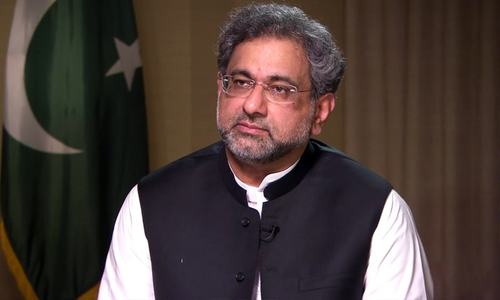US voices concern about stability of Pakistan government

WASHINGTON: US Secretary of State Rex Tillerson said after a meeting with Foreign Minister Khawaja Asif on Wednesday that he believed the United States had a reliable partner in Pakistan.
In his brief remarks to the media following the meeting, Secretary Tillerson expressed concerns about the future of Pakistan’s government, stressing that Washington wanted a stable government in Islamabad.
While the secretary’s remarks about the future of US and Pakistan’s relationship came as a pleasant surprise for Pakistan observers in Washington, his comments on stability of the government in Islamabad alarmed many. This marks the first time a US official has publicly addressed the political conflict in Islamabad, clearly backing the political setup.
When asked if the meeting with Pakistan’s foreign minister had convinced him that the United States had a reliable partner in Pakistan, Secretary Tillerson responded: “Yes, I believe we do.”
The top US diplomat added that US-Pakistan relationship held extraordinary importance in the region. “And as we rolled out the South Asia strategy, we spoke about it in a regional context,” he said.
FM Khawaja Asif meets Tillerson at State Department
“It is not just about Afghanistan. This is about the importance of Pakistan, and Pakistan’s long-term stability as well,” said Mr Tillerson, directly addressing Islamabad’s fear that Washington continued to view its relationship with Pakistan from the perspective of neighbouring Afghanistan, and in doing so, ignored Islamabad’s interests.
Although the question put to him did not mention the political situation in Pakistan, Mr Tillerson used the opportunity to address it. “We have concerns about the future of Pakistan’s government too, in terms of them — we want their government to be stable. We want it to be peaceful. And many of the same issues they’re struggling with inside of Pakistan are our issues,” he said.
The secretary of state added: “So, we think there is an opportunity for us to strengthen that relationship. We’re going to be working very hard at all levels, from the State Department to the Defence Department to our intelligence communities, as well as economic, commerce opportunities as well.”
This was an obvious reference to concerns, expressed both publicly and privately, by US and Pakistani officials since Aug 21, when President Donald Trump announced his new strategy for South Asia in a speech from the White House. Informed leaks to the media indicated that the US-Pakistan relationship was on the brink of a break-up.
Even on Wednesday, a number of news outlets in the US and Pakistan reported that the Trump administration could strike Pakistan out of its list of major non-Nato allies and stop, or greatly reduce, its economic and military assistance to Islamabad. Some reports also talked about the possibility of expanding drone strikes inside Pakistan to target alleged terrorist safe havens.
Secretary Tillerson, however, reemphasised the need to engage with Pakistan at all levels — instead of walking away from it — for rebuilding a relationship that has been and continue to be mutually beneficial.
He explained that the new US strategy for South Asia “really is a regional approach, and Pakistan is critical, I think, to the long-term stability of the region”.
Later, the Pakistan Embassy issued a statement, saying that Foreign Minister Asif and Secretary Tillerson had met at the State Department on Wednesday for an exchange of views on bilateral and regional issues of mutual interest. Mr Asif, who is visiting Washington at Secretary Tillerson’s invitation, said that Pakistan and the United States shared a common desire for peace and stability in Afghanistan and the region at large, the embassy’s statement said.
Mr Asif had pointed out that Pakistan was winning its war against terrorism, and in contrast to other countries, the incidence of terrorism in Pakistan had seen a marked decline. This has also had a salutary impact on economic and commercial activity which was made possible because Pakistan had pursued zero-tolerance and indiscriminate approach in its campaign against all terrorist and militant groups, he said.
The minister informed the secretary of state about the strong public reaction in Pakistan to the US administration’s South Asia Policy — “based on inadequate recognition of Pakistan’s sterling contribution in the fight against terrorism”.
The embassy said that Secretary Tillerson had acknowledged and appreciated the sacrifices rendered by the people and armed forces of Pakistan in the struggle against terrorism. He said that Pakistan’s interests and concerns would be accommodated since its role was critical to President Trump’s South Asia Strategy. He added that future stability of Pakistan was an important element of the US strategy.
The foreign minister urged the United States to take note of the gross human rights violations being perpetrated by Indian security forces in Occupied Kashmir. He said peace in South Asia would remain out of reach until the resolution of all longstanding disputes, including the core dispute of Jammu and Kashmir.
Mr Asif also invited Secretary Tillerson to visit Islamabad to continue their discussions, which the US diplomat accepted.
Published in Dawn, October 5th, 2017



































